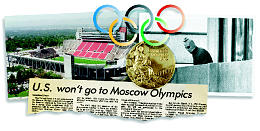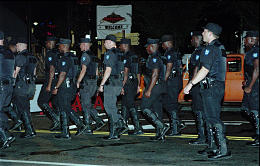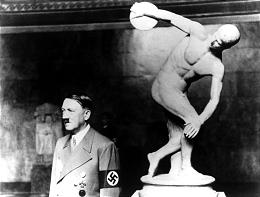 Politics and terrorism have been a concern ever since the 1972 attack in Munich. |
A symbol of "America's Games" just five months away.
Unwittingly, the flag also may represent a symbolic target, for the 2002
Winter Games have increasingly become the focus of anti-terrorism discussions
and security preparations. From Salt Lake water treatment plants to downtown
rail yards, the possibility of terrorist attacks — no matter how preposterous or
unfathomable a month ago — is given very real consideration.
The Sept. 11 terrorist attacks proved anything can happen, and massive
security precautions are under way to ensure the worst fears are not realized.
Top U.S. officials, plus Utah's congressional delegation and Salt Lake City
Mayor Rocky Anderson, will meet in Washington, D.C., to discuss protecting Salt
Lake's Winter Games.
"I would not say it will happen. What I would say is the Olympics are a prime
stage for terrorists," said George Eisen, an expert in international terrorism
and consultant to past Olympics.
Eisen said organized terrorism has two distinct goals: inflicting the maximum
amount of humiliation and publicizing the terrorists' cause to the widest
possible audience.
In the case of attacks on the World Trade Center and Pentagon, the goal, he
said, was to humiliate America's economic, military and political
infrastructure. And, because of live television, the images of the terror
forever will be ingrained in the Western psyche, officials say.
And that is why the Winter Games in Salt Lake City also could be a huge
target for terrorists.
Not only is America the host country, but the Games are sponsored by
international corporations that symbolize American capitalism, such companies as
Coca-Cola and McDonald's. And they will be attended by political leaders from
dozens of nations that support the American political agenda.
And some 2 billion to 3 billion people around the world will watch television
broadcasts of the Games.
"The Olympics are the ultimate world stage," said Eisen, director of the
Center for International Education at William Paterson University in New Jersey.
"All the elements are there . . . to provide the ultimate venue for publicizing
the terrorist cause."
Salt Lake Organizing Committee President Mitt Romney disagrees, saying the
Olympics are a nonpolitical event that does not meet terrorists' objectives. And
the Games, with their tight security and international flavor, are anything but
an ideal target.
"Attacking the Olympic Games and young athletes would do nothing but alienate the entire world," he said.
American targets
Romney, who is briefed regularly by federal officials overseeing security for
the Games, said there is general agreement among security experts that the Games
are not a good target for terrorism, but all precautions are being taken
anyway.
"There are plenty of targets that would be more American," he insisted,
adding other sporting events to that category.
 Security officers march into Centennial Olympic Park in Atlanta following an explosion that occurred early in the morning of July 27, 1996. Associated Press |
However, a statement released Tuesday by the chief military commander for
Osama bin Laden, the suspected mastermind in the Sept. 11 attacks, warned that
if the United States retaliates, "wherever there are Americans and Jews, they
will be targeted."
Are intelligence sources convinced the 2002 Winter Games are indeed a target?
Media reports in recent days have cited those who fear that terrorists are
planning to attack a large group of people at a sporting event. And they don't
come much bigger than the Olympics.
Lisa Delpy Neirotti, a professor of sports management at George Washington
University, believes "terrorism is always a threat" at Olympic Games, ever since
the 1972 attack in Munich.
But the Winter Games in Salt Lake City are also the most prepared of any
sporting event in the United States to deter such an attack.
"It's almost the safest place to be, at least when it comes to any big
gathering of people," said Neirotti, a scholar of the modern Olympic movement
who has attended 10 consecutive Games since 1984.
An attack on the Games, she said, could "put mud on America's face . . . but
I see the Super Bowl as more of a target because it is such an American
icon."
David Romano, senior research scientist in the Mediterranean Section at the
University of Pennsylvania Museum and one of the world's foremost experts on the
history of the Olympic Games, says the history of the Games, both ancient and
modern, are replete with examples of individuals using the Games to further
their political and military interests, often with considerable bloodshed.
In modern times, the Games have commonly been used as a platform for
political agendas. Not only did Palestinian terrorists use the Munich Games as a
stage for their cause, but Adolf Hitler used the Berlin Games for his political
purposes.
The Americans boycotted the Summer Games in Moscow because of the Soviet
invasion of Afghanistan, and the Soviets retaliated by boycotting the Summer
Games in Los Angeles.
Games in Mexico City became a stage for athletes to promote black rights. And
the man wanted in the deadly bombing during the Atlanta Games is suspected of
trying to draw attention to his violent anti-abortion agenda.
"The Olympic Games have always been political," Romano said. "With more than
190 countries participating, representing many different cultures, different
languages and different religions, it is only natural they would become
political."
And to think the Games, because they are international and secular, are exempt from the political stage used by terrorists would be naive. "It is a natural stage for many things political to happen," he said.
Terrorism types
Experts on all sides of the debate agree on one thing: Modern terrorism comes
in many shapes and forms, from organized groups with meticulous planning to a
single individual acting on his or her own political agenda. Romney calls the
individuals "wackos" — and they are much more difficult to deter than organized
terrorism.
 German Chancellor Adolf Hitler attempted to use the Berlin Games in 1936 for his political purposes. |
Based on the terrorism formula of maximum humiliation and maximum publicity,
what would be the potential Utah targets of terrorism? There are plenty from
which to choose.
Perhaps the most obvious targets are opening and closing ceremonies, expected
to draw tens of thousands from all over the world, including heads of state, for
an event to be televised live to an international audience.
"Could this tragedy happen at Rice-Eccles Stadium . . . for the closing and
opening ceremonies? Absolutely," Salt Lake County Sheriff Aaron Kennard told
reporters earlier this month.
Even Temple Square and The Church of Jesus Christ of Latter-day Saints Office
Building must be considered potential targets. The jihad launched by Muslim
fundamentalists encourages the killing of all non-Muslims and even Muslims who
do not subscribe to their fundamentalism.
And there is always the possibility of home-grown terrorism by individuals
with long-standing personal and religious grudges against the LDS Church.
Church spokesman Dale Bills said the safety of visitors and employees is a
"foremost concern," and in light of the Sept. 11 attacks security procedures are
being reviewed. Representatives of the Church Security Department also serve on
a committee working with the Utah Olympic Public Safety Command "to ensure that
appropriate measures are in place for the Olympics."
Salt Lake Police Chief Rick Dinse told the Deseret News, "Our plans are as
good as we can make them without keeping people away. It will be a safe
environment, probably more so than any other time in Salt Lake City."
Romney maintains the $200 million security effort is being directed at every
imaginable possibility, and he is satisfied those efforts will be adequate to
protect athletes, dignitaries and visitors "for a specific piece of real estate
for a specific period of time."
Is there no risk of attack? Romney said there are always risks, but you
minimize them and deal with them. He is confident enough in the Games security
that he has invited 55 members of his family to the Games, and all are
coming.
Low risk or not, federal officials are taking a cautious approach to
potential terrorist attacks. Olympic athletes involved in military-sponsored
training programs are no longer allowed to talk to the media unless approved by
officials in Washington, D.C. The reason, said U.S. Army spokeswoman Harriet
Rice, is security for the athletes.
One athlete, speaking without permission, told the Deseret News that government officials "fear we could be targeted by terrorists."
Catastrophic fears
Nationally, there is growing concern that the next wave of terrorist attacks
will involve something even more horrific than the attacks on the World Trade
Center and Pentagon, and that it will involve massive loss of human life.
Eisen said the real concern of the CIA and FBI is not so much a physical
attack as it is a biological or chemical attack, perhaps by attacking interstate
shipments of hazardous chemicals used by industry.
John Bromley, Union Pacific Railroad spokesman, said about 5 percent of its
total rail shipments involves hazardous materials used mostly by industry.
Union Pacific has no plans to suspend interstate shipments of hazardous
materials during the Games, and most of those materials will pass near downtown
Salt Lake City.
The railroads all have their own security teams that guard against sabotage,
and they have long-standing plans in place to deal with any release of hazardous
materials. But it would be difficult, at best, to guard against sabotage along
all of the thousands of miles of rail on all 34 trains that pass through Utah
each day, Bromley said.
"We don't know if we will be doing anything different for the Olympics, but
we are certainly discussing it internally," he said.
The potential for terror attacks extends far beyond the railroads. Every day,
hundreds of semitrailer trucks carry hazardous materials through the heart of
the city, mostly on I-15 and I-80. And four oil refineries straddle the Salt
Lake-Davis County line, all with massive quantities of hazardous hydrofluoric
acid used in the refining process.
Worst-case scenarios developed by the companies, local fire departments and
the Environmental Protection Agency indicate that entire neighborhoods with tens
of thousands of residents in Salt Lake City and south Davis County could be
engulfed by toxic gases in the event emergency shutoff systems all fail and
there is a massive release of chemicals.
Officials are also worried about possible terrorist strikes against dams and water treatment facilities. The FBI has been working closely with state and local water officials to identify potential targets and decrease their vulnerability to attack.
Munich perspective
Eisen said terrorism has been a real threat at every Olympics since 1972 when
commandos from the Palestinian terrorist group Black September took the Israeli
Olympic team hostage. Eleven Israeli athletes, one German policeman and five
terrorists died in a botched rescue attempt.
The 30-year-old image of black-hooded terrorists on a Munich balcony remains
a permanent image of Olympic terrorism. "Until that moment, terrorism was
faceless," Eisen said.
And in much the same way, the television images of jets smashing into the
World Trade Center have created the same permanent image in Americans' minds.
"It was a lesson not for a lifetime, but forever," he said. "It was a wake-up
call."
Eisen said it will be difficult to protect all the venues, all the events,
all the athletes and everyone else from presidents to sports enthusiasts
gathered in large crowds at an internationally televised event.
"But I don't think you need to be more concerned than anyone else in America today," he said. "I believe the best way to combat terrorism is not to give in. Life must go on. The best response is not to let them intimidate us."
Monday's story: Chemical and biological threats.
E-mail: spang@desnews.com
© 2001 Deseret News Publishing Company